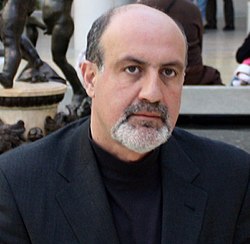Nassim Nicholas Taleb Quote
It does not mean that one’s personal experiences constitute a sufficient sample to derive a conclusion about an idea; it is just that one’s personal experience gives the stamp of authenticity and sincerity of opinion. Experience is devoid of the cherry-picking that we find in studies, particularly those called observational, ones in which the researcher finds past patterns, and, thanks to the sheer amount of data, can therefore fall into the trap of an invented narrative. Further, in writing, I feel corrupt and unethical if I have to look up a subject in a library as part of the writing itself. This acts as a filter—it is the only filter. If the subject is not interesting enough for me to look it up independently, for my own curiosity or purposes, and I have not done so before, then I should not be writing about it at all, period. It does not mean that libraries (physical and virtual) are not acceptable; it means that they should not be the source of any idea. Students pay to write essays on topics for which they have to derive knowledge from a library as a self-enhancement exercise; a professional who is compensated to write and is taken seriously by others should use a more potent filter. Only distilled ideas, ones that sit in us for a long time, are acceptable—and those that come from reality.
It does not mean that one’s personal experiences constitute a sufficient sample to derive a conclusion about an idea; it is just that one’s personal experience gives the stamp of authenticity and sincerity of opinion. Experience is devoid of the cherry-picking that we find in studies, particularly those called observational, ones in which the researcher finds past patterns, and, thanks to the sheer amount of data, can therefore fall into the trap of an invented narrative. Further, in writing, I feel corrupt and unethical if I have to look up a subject in a library as part of the writing itself. This acts as a filter—it is the only filter. If the subject is not interesting enough for me to look it up independently, for my own curiosity or purposes, and I have not done so before, then I should not be writing about it at all, period. It does not mean that libraries (physical and virtual) are not acceptable; it means that they should not be the source of any idea. Students pay to write essays on topics for which they have to derive knowledge from a library as a self-enhancement exercise; a professional who is compensated to write and is taken seriously by others should use a more potent filter. Only distilled ideas, ones that sit in us for a long time, are acceptable—and those that come from reality.
Related Quotes
About Nassim Nicholas Taleb
Taleb is the author of the Incerto, a five-volume work on the nature of uncertainty published between 2001 and 2018 (notably, The Black Swan and Antifragile). He has taught at several universities, serving as a Distinguished Professor of Risk Engineering at the New York University Tandon School of Engineering since September 2008. He has also been a practitioner of mathematical finance and is currently an adviser at Universa Investments. The Sunday Times described his 2007 book The Black Swan as one of the 12 most influential books since World War II.
Taleb criticized risk management methods used by the finance industry and warned about financial crises, subsequently profiting from the Black Monday (1987) and the 2008 financial crisis. He advocates what he calls a "black swan robust" society, meaning a society that can withstand difficult-to-predict events. He proposes what he has termed "antifragility" in systems; that is, an ability to benefit and grow from a certain class of random events, errors, and volatility, as well as "convex tinkering" as a method of scientific discovery, by which he means that decentralized experimentation outperforms directed research.
